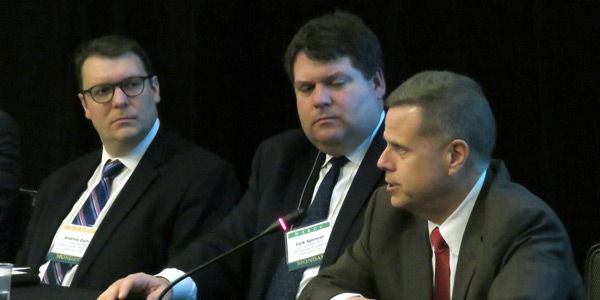By Rich Heidorn Jr.
WASHINGTON — Little more than a month after taking office in 2009, President Barack Obama ordered the Nuclear Regulatory Commission to stop work on a permit for licensing the nuclear waste depository at Yucca Mountain in Nevada. Obama acted at the behest of then-Sen. Harry Reid (D-Nev.).

The license application for the site, almost 140 miles northwest of Las Vegas, was the product of 30 years of work and $15 billion in spending, and the cancellation outraged nuclear operators and state regulators.

With Reid retired and a new president in office, two major political obstacles to Yucca are gone. But that doesn’t mean it will be quick or easy to solve the problem that has left the waste stored at almost 100 nuclear sites around the country.
“The last eight years has … just been a major setback for our nuclear waste policy,” Andy Zach, a staffer on the House Energy and Commerce Committee, told the National Association of Regulatory Utility Commissioners.
“It is going to take us a long time to dig out from where we are. That goes across the board: setting up an organization; reconstituting the key support contractors who did the work on the license application. … There has been an atrophy of talent, physical assets and a knowledge base that is going to have to be rebuilt.”

Michael McKenna, president of lobbying firm MWR Strategies, said the government has to be “nimble” enough to move toward Yucca and also develop an interim storage facility until the site is approved and ready to accept shipments.
But Jack Spencer, vice president of the Heritage Foundation’s Institute for Economic Freedom and Opportunity, said he believes an interim site is a mistake. “I think it releases all the pressure to complete Yucca Mountain,” he said.
Spencer said he believes Nevada’s opposition to the site can be overcome.
“I think that Nevada probably is largely against nuclear waste at Yucca Mountain in the context of it’s been [forced on it].

“I am nothing if not a believer in a free market, and I think most things have a price on them. And I think by … empowering [Nevada] to have some regulatory control — to say, ‘This is what it’s going to cost you’ — I think that we will probably negotiate something that will lead to a solution there.”
Spencer also said the 1982 Nuclear Waste Policy Act, which directed the Department of Energy to build a repository for used nuclear fuel and other high-level radioactive waste, should be rewritten.
“I think ultimately what we need in order to have the system work is to have the waste producers responsible for waste management,” he said. “My theory is [utilities] can do it cheaper than the government.”




